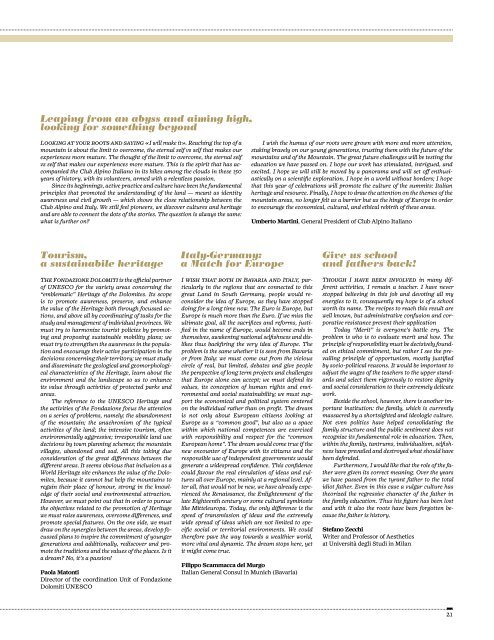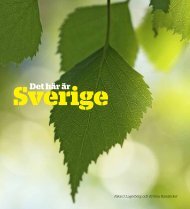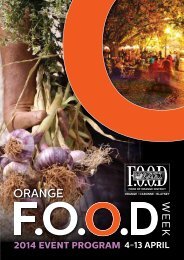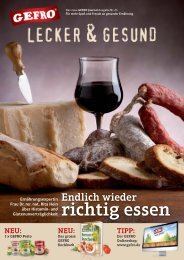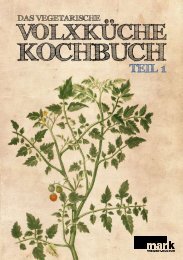Cortina Inverno
Eccoci arrivati al decimo numero di CORTINA.TOPic. Una bella strada, quella che abbiamo percorso assieme. Con un obiettivo interessante, quello di dar vita — cinque stagioni or sono — a una rivista dalla doppia vocazione: di approfondimento e promozione, capace di immortalare la Cortina che ci piace e di dar voce a chi la ama, guardando sempre al futuro, forti di un illustre passato.
Eccoci arrivati al decimo numero di CORTINA.TOPic.
Una bella strada, quella che abbiamo percorso assieme. Con
un obiettivo interessante, quello di dar vita — cinque stagioni
or sono — a una rivista dalla doppia vocazione: di approfondimento
e promozione, capace di immortalare la Cortina che
ci piace e di dar voce a chi la ama, guardando sempre al futuro, forti di un
illustre passato.
You also want an ePaper? Increase the reach of your titles
YUMPU automatically turns print PDFs into web optimized ePapers that Google loves.
Leaping from an abyss and aiming high,<br />
looking for something beyond<br />
Looking at your boots and saying «I will make it». Reaching the top of a<br />
mountain is about the limit to overcome, the eternal self vs self that makes our<br />
experiences more mature. The thought of the limit to overcome, the eternal self<br />
vs self that makes our experiences more mature. This is the spirit that has accompanied<br />
the Club Alpino Italiano in its hikes among the clouds in these 150<br />
years of history, with its volunteers, armed with a relentless passion.<br />
Since its beginnings, active practice and culture have been the fundamental<br />
principles that promoted the understanding of the land — meant as identity<br />
awareness and civil growth — which shows the close relationship between the<br />
Club Alpino and Italy. We still feel pioneers, we discover cultures and heritage<br />
and are able to connect the dots of the stories. The question is always the same:<br />
what is further on?<br />
Tourism,<br />
a sustainabile heritage<br />
The Fondazione Dolomiti is the official partner<br />
of UNESCO for the variety areas concerning the<br />
“emblematic” Heritage of the Dolomites. Its scope<br />
is to promote awareness, preserve, and enhance<br />
the value of the Heritage both through focussed actions,<br />
and above all by coordinating of tasks for the<br />
study and management of individual provinces. We<br />
must try to harmonize tourist policies by promoting<br />
and proposing sustainable mobility plans; we<br />
must try to strengthen the awareness in the population<br />
and encourage their active participation in the<br />
decisions concerning their territory; we must study<br />
and disseminate the geological and geomorphological<br />
characteristics of the Heritage, learn about the<br />
environment and the landscape so as to enhance<br />
its value through activities of protected parks and<br />
areas.<br />
The reference to the UNESCO Heritage and<br />
the activities of the Fondazione focus the attention<br />
on a series of problems, namely: the abandonment<br />
of the mountain; the anachronism of the typical<br />
activities of the land; the intensive tourism, often<br />
environmentally aggressive; irresponsible land use<br />
decisions by town planning schemes; the mountain<br />
villages, abandoned and sad. All this taking due<br />
consideration of the great differences between the<br />
different areas. It seems obvious that inclusion as a<br />
World Heritage site enhances the value of the Dolomites,<br />
because it cannot but help the mountains to<br />
regain their place of honour, strong in the knowledge<br />
of their social and environmental attraction.<br />
However, we must point out that in order to pursue<br />
the objectives related to the promotion of Heritage<br />
we must raise awareness, overcome differences, and<br />
promote special features. On the one side, we must<br />
draw on the synergies between the areas, develop focussed<br />
plans to inspire the commitment of younger<br />
generations and additionally, rediscover and promote<br />
the traditions and the values of the places. Is it<br />
a dream? No, it’s a passion!<br />
Paola Matonti<br />
Director of the coordination Unit of Fondazione<br />
Dolomiti UNESCO<br />
Italy-Germany:<br />
a Match for Europe<br />
I wish that both in Bavaria and Italy, particularly<br />
in the regions that are connected to this<br />
great Land in South Germany, people would reconsider<br />
the idea of Europe, as they have stopped<br />
doing for a long time now. The Euro is Europe, but<br />
Europe is much more than the Euro. If we miss the<br />
ultimate goal, all the sacrifices and reforms, justified<br />
in the name of Europe, would become ends in<br />
themselves, awakening national selfishness and dislikes<br />
thus backfiring the very idea of Europe. The<br />
problem is the same whether it is seen from Bavaria<br />
or from Italy: we must come out from the vicious<br />
circle of real, but limited, debates and give people<br />
the perspective of long term projects and challenges<br />
that Europe alone can accept; we must defend its<br />
values, its conception of human rights and environmental<br />
and social sustainability; we must support<br />
the economical and political system centered<br />
on the individual rather than on profit. The dream<br />
is not only about European citizens looking at<br />
Europe as a “common good”, but also as a space<br />
within which national competences are exercised<br />
with responsibility and respect for the “common<br />
European home”. The dream would come true if the<br />
new encounter of Europe with its citizens and the<br />
responsible use of independent governments would<br />
generate a widespread confidence. This confidence<br />
could favour the real circulation of ideas and cultures<br />
all over Europe, mainly at a regional level. After<br />
all, that would not be new, we have already experienced<br />
the Renaissance, the Enlightenment of the<br />
late Eighteenth century or some cultural symbiosis<br />
like Mitteleuropa. Today, the only difference is the<br />
speed of transmission of ideas and the extremely<br />
wide spread of ideas which are not limited to specific<br />
social or territorial environments. We could<br />
therefore pave the way towards a wealthier world,<br />
more vital and dynamic. The dream stops here, yet<br />
it might come true.<br />
Filippo Scammacca del Murgo<br />
Italian General Consul in Munich (Bavaria)<br />
I wish the humus of our roots were grown with more and more attention,<br />
staking bravely on our young generations, trusting them with the future of the<br />
mountains and of the Mountain. The great future challenges will be testing the<br />
education we have passed on. I hope our work has stimulated, intrigued, and<br />
excited. I hope we will still be moved by a panorama and will set off enthusiastically<br />
on a scientific exploration. I hope in a world without borders; I hope<br />
that this year of celebrations will promote the culture of the summits: Italian<br />
heritage and resource. Finally, I hope to draw the attention on the themes of the<br />
mountain areas, no longer felt as a barrier but as the hinge of Europe in order<br />
to encourage the economical, cultural, and ethical rebirth of these areas.<br />
Umberto Martini, General President of Club Alpino Italiano<br />
Give us school<br />
and fathers back!<br />
Though I have been involved in many different<br />
activities, I remain a teacher. I have never<br />
stopped believing in this job and devoting all my<br />
energies to it, consequently my hope is of a school<br />
worth its name. The recipes to reach this result are<br />
well known, but administrative confusion and corporative<br />
resistance prevent their application<br />
Today “Merit” is everyone’s battle cry. The<br />
problem is who is to evaluate merit and how. The<br />
principle of responsibility must be decisively founded<br />
on ethical commitment, but rather I see the prevailing<br />
principle of opportunism, mostly justified<br />
by socio-political reasons. It would be important to<br />
adjust the wages of the teachers to the upper standards<br />
and select them rigorously to restore dignity<br />
and social consideration to their extremely delicate<br />
work.<br />
Beside the school, however, there is another important<br />
institution: the family, which is currently<br />
massacred by a shortsighted and ideologic culture.<br />
Not even politics have helped consolidating the<br />
family structure and the public sentiment does not<br />
recognize its fundamental role in education. Then,<br />
within the family, tantrums, individualism, selfishness<br />
have prevailed and destroyed what should have<br />
been defended.<br />
Furthermore, I would like that the role of the father<br />
were given its correct meaning. Over the years<br />
we have passed from the tyrant father to the total<br />
idiot father. Even in this case a vulgar culture has<br />
theorized the regressive character of the father in<br />
the family education. Thus his figure has been lost<br />
and with it also the roots have been forgotten because<br />
the father is history.<br />
Stefano Zecchi<br />
Writer and Professor of Aesthetics<br />
at Università degli Studi in Milan<br />
21


